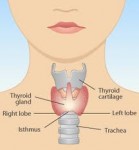 For such a little organ, the thyroid gland sure can cause a lot of trouble. This small, butterfly-shaped gland controls nearly all of your body’s metabolic processes by secreting different kinds of hormones. Almost 60 million Americans are estimated to have some sort of thyroid problem and a vast majority of these individuals don’t even realize it.
For such a little organ, the thyroid gland sure can cause a lot of trouble. This small, butterfly-shaped gland controls nearly all of your body’s metabolic processes by secreting different kinds of hormones. Almost 60 million Americans are estimated to have some sort of thyroid problem and a vast majority of these individuals don’t even realize it.
Women have a much greater chance of developing thyroid disease than men—researchers estimate that women are 6-8 times more likely to develop thyroid conditions in their lifetimes.
Thyroid disease can refer to anything from hyperthyroidism (overactive thyroid) to thyroid nodules to thyroid cancer. The first step in understanding the thyroid and your personal risk factor is to educate yourself on the different types. Pay special attention to the symptoms and see which ones apply to you.
Some of the most common symptoms include:
- Persistent weakness or pain in the muscles and joints
- Hair loss
- Sudden changes in weight
- Inexplicable mood changes, especially depression
- Irregular menstruation
- Irregular bowel movements (constipation or diarrhea)
- Neck swelling
If you are experiencing several of these symptoms, a TSH screening is good place to start; this simple blood test determines how well your thyroid is functioning.
Once you are diagnosed with a thyroid disorder, there are several treatment options ranging from surgery (for cancer, goiters, and nodules) to drug therapy. Just know that there are several treatment options to choose from and that (most importantly) you are not alone.
Guest Author: Carolyn Heintz is a nutritionist, freelance writer and mother who has dedicated her life to building a comprehensive knowledge of how to eat, exercise, and live well. In her spare time, she runs her personal health and wellness blog.

 pregnant women with gestational hypothyroidism may go undetected each year.
pregnant women with gestational hypothyroidism may go undetected each year.